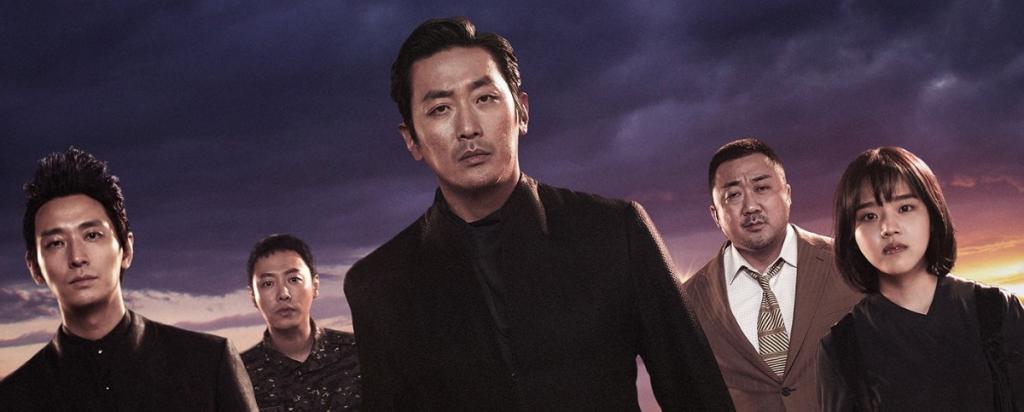Director Kim Yong-Hwa made a major hit for himself late last year adapting Korean fantasy webtoon, Along With The Gods: The Two Worlds. The film even took me by surprise thinking it would be one straightforward film at one point and not knowing right away there would be an almost immediate back-to-back sequel, and even learning recently that more developments for the big and small screen were in bound.
Immersed in a Buddhist narrative, the first movie is one of nearly constant emotive stimulus, coupled with big scale battles with mystical weapons against varying creatures and entites, including a fast-growing demonic vengeful spirit proving pivotal in the movie’s progression. The drama is heavy-handed amidst a sprawling millieu spanning Earth and the Afterworld, and the action left an almost anime-inspired feel with our characters moving at lightning speed.
All these and more now draw us into next chapter, Along With The Gods: The Last 49 Days, as the plot centers partially back on the Kim family, this time with actor Kim Dong-Wook reprising the role of Soo-Hong. Following the events of the previous film, our hero guardians – the rigid and stoic Gang Lim (Ha Jung-Woo), the boyish, often nonchalant but brave Hae Won-Maek (Ju Ji-Hoon), and the vibrant, nurturing and intelligent Duk-Choon (Kim Hyang-Gi), assigned to represent souls as potential crossovers for reincarnation, carry over into their next assignment from King Yeomra (Lee Jung-Jae) as they now have forty-nine days to prove Soo-Hong’s death in the first movie was premeditated.
Simultaneously, they must also ascend the spirit of recurring character Hur Choon-Sam (Nam Il-woo) an ailing, struggling elder whose nephew lives in his care – that is, if they can get past the ever-vigilant, incorrigible and seemingly immovable outlaw guardian, Sung Ju (Don Lee) who has since been coined as the Uncle by Choon-Sam’s nephew. In the course of this epic joruney and with the copious amounts of forbidden intervention our guardians are implored to commit, new revelations are made with Soo-Hong pressing Gang Lim for details about his past, as is Sung-Ju who claims to know more about the histories of his newfound guests in Duk-Choon and Hae Won-Maek seeing as their memories were wiped per the conditions of their guardianships, save for Gang Lim’s.
Kim Yong-Hwa goes for a much less emotionally driven tale this time around whilst sticking to size, scope and character development with much more drama and spates of comedy to boot; Actor Lim Won-Hee returns as one of the bumbling prosecutors with Jo Han-Chul replacing the noticeably absent Oh Dal-Su. In conjunction, the sequel draws more heavily on its revelations than building on making Soo-Hong’s case as it is exactly attented within the first hour and thereafter as the film progresses and we begin to learn why, particularly with King Yeomra playing a much greater hand than most of us expect.
The action takes the same approach with respect to the abilities of our guardians to move with enormous speed and agility, mainly that of Hae Won-Maek in his fight scene with God Of House. By comparison, we see more shots and scenes of this with the role of Gang Lim whose sequences seeing him hunt down Soo Hong in his vengeful spirit state prove a lot more thrilling with an almost Dragonball Z-like effect (something which took heed with me upon watching Kiriya Kazuaki’s inaugural robot army battle midway of his noteworthy 2004 adaptation Casshern).
Kim’s sequel also builds up a bit on creature lore and you might even be welcome to the notion that he’s been paying attention to Universal and Legendary film fandom for it. The action in the flashback sequences are moreso used to anchor the ensuing arc that recurs as we learn more about their histories and what it all means by the time we reach the third act; The story’s unraveling does reach a bit of a dramatic boiling point where the viewer is left unsure of what will happen next as our trio of guardians struggles to maintain morale for the sake of their assignments and their subjects.
Soo-Hong’s story arc feels a little more wasted while his presence and performance offer ancillary support to the film’s progression. Compared to his sibling counterpart in Cha Tae-Hyun’s role of Ja-Hong with the first film, Soo-Hong’s personality is not without its bittersweetness and harder edges. The story is less focused on his role throughout the film in conjuction with critiquing his character and legacy in the living world. Given the little attention as his role gets at least until the third act, this may be worth approving considering what we know of him in the first film, as well as the stakes that keep the sequel engine running on this end.
As with CG-interfacing, you won’t be too disappointed depending on how you perceive the practice. Such technology is great to see put into use while really, the only thing that might kill this franchise is if it takes the Disney route and tries to bring us back-to-back movies, and with any luck, they’ll be smart and choose not to.
Aside from that, if you’re not in tune yet with Along With The Gods and you live for sweeping fantasy action, adventure and danger with a supernatural courtroom drama layering in between, Kim Yong-Hwa’s work here might just be what the doctor ordered. Along With The Gods: The Last 49 Days brings with it a ton of gripping twists and intrigue right into post-credits, accompanying characters you already care about as the saga presses on into deeper hells, paradoxical tragedy and tumult, and self-discovery.

